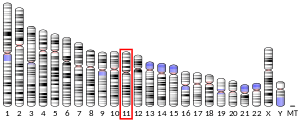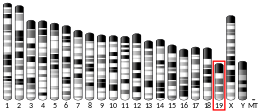KCNK7
Potassium channel, subfamily K, member 7, also known as KCNK7 or K2P7.1 is a protein which is encoded in humans by the KCNK7 gene. K2P7.1 is a potassium channel containing two pore-forming P domains.[5][6][7] Multiple transcript variants encoding different isoforms have been found for this gene.[8]
Function
This gene encodes a member of the superfamily of potassium channel proteins containing two pore-forming P domains. The product of this gene has not been shown to be a functional channel; It may require other non-pore-forming proteins for activity.[8]
See also
- Tandem pore domain potassium channel
References
- GRCh38: Ensembl release 89: ENSG00000173338 - Ensembl, May 2017
- GRCm38: Ensembl release 89: ENSMUSG00000024936 - Ensembl, May 2017
- "Human PubMed Reference:". National Center for Biotechnology Information, U.S. National Library of Medicine.
- "Mouse PubMed Reference:". National Center for Biotechnology Information, U.S. National Library of Medicine.
- Salinas M, Reyes R, Lesage F, Fosset M, Heurteaux C, Romey G, Lazdunski M (April 1999). "Cloning of a new mouse two-P domain channel subunit and a human homologue with a unique pore structure". J. Biol. Chem. 274 (17): 11751–60. doi:10.1074/jbc.274.17.11751. PMID 10206991.
- Goldstein SA, Bockenhauer D, O'Kelly I, Zilberberg N (March 2001). "Potassium leak channels and the KCNK family of two-P-domain subunits". Nat. Rev. Neurosci. 2 (3): 175–84. doi:10.1038/35058574. PMID 11256078.
- Goldstein SA, Bayliss DA, Kim D, Lesage F, Plant LD, Rajan S (December 2005). "International Union of Pharmacology. LV. Nomenclature and molecular relationships of two-P potassium channels". Pharmacol. Rev. 57 (4): 527–40. doi:10.1124/pr.57.4.12. PMID 16382106.
- "Entrez Gene: potassium channel".
Further reading
- Strausberg RL, Feingold EA, Grouse LH, et al. (2002). "Generation and initial analysis of more than 15,000 full-length human and mouse cDNA sequences". Proc. Natl. Acad. Sci. U.S.A. 99 (26): 16899–903. doi:10.1073/pnas.242603899. PMC 139241. PMID 12477932.
- Goldstein SA, Bockenhauer D, O'Kelly I, Zilberberg N (2001). "Potassium leak channels and the KCNK family of two-P-domain subunits". Nat. Rev. Neurosci. 2 (3): 175–84. doi:10.1038/35058574. PMID 11256078.
- Salinas M, Reyes R, Lesage F, et al. (1999). "Cloning of a new mouse two-P domain channel subunit and a human homologue with a unique pore structure". J. Biol. Chem. 274 (17): 11751–60. doi:10.1074/jbc.274.17.11751. PMID 10206991.
- Medhurst AD, Rennie G, Chapman CG, et al. (2001). "Distribution analysis of human two pore domain potassium channels in tissues of the central nervous system and periphery". Brain Res. Mol. Brain Res. 86 (1–2): 101–14. doi:10.1016/S0169-328X(00)00263-1. PMID 11165377.
External links
- KCNK7+protein,+human at the US National Library of Medicine Medical Subject Headings (MeSH)
- KCNK7 human gene location in the UCSC Genome Browser.
- KCNK7 human gene details in the UCSC Genome Browser.
This article is issued from Wikipedia. The text is licensed under Creative Commons - Attribution - Sharealike. Additional terms may apply for the media files.



